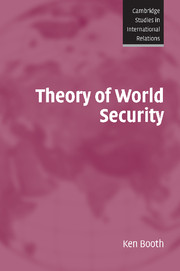8 - Who will own the twenty-first century?
Published online by Cambridge University Press: 05 June 2012
Summary
I. F. Stone said that if you expect an answer to your question during your lifetime, you're not asking a big enough question.
Kevin DanaherThe previous chapter was a critique of some key issues affecting world security, which exposed the dangers of global business-as-usual. The present chapter shifts from critique to reconstruction, and brings to the foreground three political orientations that are basic to emancipatory realism (promoting equality, humanising globalisation, and inventing humanity). The theme is to pursue world security as if people really matter. The chapter begins, however, by looking at the problem of representing the suffering that is at the heart of insecurity.
Regarding pain
Reality has abdicated. There are only representations: media.
Susan SontagThe journalist Janine di Giovanni in the late 1980s was inspired to change direction in her work by Felicia Langer, an Israeli lawyer who was devoting her life to defending Palestinians before Israeli military courts. Langer told her: ‘Write about the small voices, the people who can't write about themselves.’ She followed this vision, reporting the world ‘from the edge’. Di Giovanni's snapshots of life in the fracture zones of world politics, from Algeria in 1998 to Iraq in 2005, are required reading for students of world politics, showing something of the lives of real people in real places. This is not the case, students sometimes complain, in much that gets published in the academic literature of international relations.
- Type
- Chapter
- Information
- Theory of World Security , pp. 337 - 392Publisher: Cambridge University PressPrint publication year: 2007

